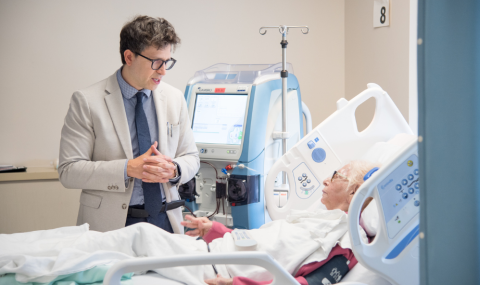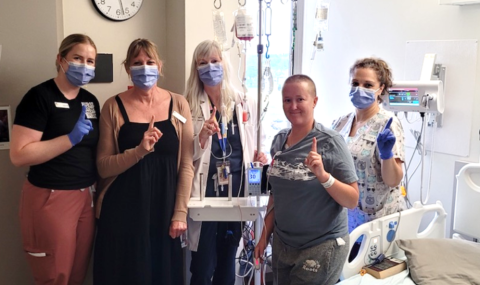In North America, prostate cancer has become the most commonly diagnosed cancer in men. It is responsible for 4,300 deaths each year in Canada alone.
Education and research are the keys to success in the diagnosis and treatment of prostate disease.
London’s medical community is a national leader in research. We also have many physicians who specialize in the management of prostate cancer.
The Translational Prostate Cancer Research Group’s purpose is to foster an environment where fundamental cancer researchers, surgeons, and clinical researchers work together. As a team, we can quickly transfer research discoveries from the "bench to the bedside" and make real advances in prostate cancer control.
Our key objective is to equip future researchers with the skills to work on the threshold between discovery and applied research. Whether new discoveries begin at the bedside or the bench, our overall goal is to understand and eventually conquer prostate cancer.
Areas of research focus for the Translational Prostate Cancer Research Group include:
- Precision radiotherapy techniques for prostate cancer. For example, we helped lead the PROFIT clinical trial that has helped establish hypofractionated radiotherapy as a standard of care for men with prostate cancer. We continue to explore new radiation delivery schedules in the context of clinical trials looking to shorten the treatment schedule even further, down to as few as five treatments over one week using image guided stereotactic radiotherapy techniques. We are also examining new ways of intra-operative planning for prostate brachytherapy including high and low dose rate techniques and the use of integrated 3D ultrasound for brachytherapy planning.
- Clinical trials of minimally invasive surgical techniques include research into the use of high intensity focused ultrasound as a primary treatment for prostate cancer and as a salvage therapy for prostate cancer after prior radiation treatments. For exempt the TACT study examining the using of MR guided transurethral ultrasound for the treatment of prostate cancer. We are also participating in studies of MR guided biopsy (ASIST, PRECISION) to improve our ability to accurately diagnosis prostate cancer. Citywide we collaborate on research into the use of minimally invasive robotic surgery and novel forms of intraoperative guidance using robotic techniques.
- Identification of novel biomarkers such as the characterization of circulating tumor cells as predictor of response to systemic therapies. Our researchers are also engaged in the design of novel peptides binding to prostate cancer specific targets to develop novel imaging and therapeutic agents.
- We have an active clinical trials group and participate in Phase I-III studies of new systemic therapies and personalized medicine approaches in prostate cancer. For example, clinical trials that use genomic analysis of metastatic prostate cancer from blood samples (ciculating tumor cells or circulating tumor DNA) to select patients for treatment with investigational drugs targeting their specific tumor mutations.
- Development of novel prostate imaging techniques including novel MRI imaging, such as sodium imaging of the prostate as a non-invasive measure of tumor grade/aggressiveness. We are also leading in the design and execution of clinical trials investigating the utility of novel PSMA PET imaging agents in the preoperative characterization of newly diagnosed prostate cancer, early detection of recurrent prostate cancer and assessment of treatment response in advanced prostate cancer. A novel imaging-histology pipeline has been developed to allow robust validation of novel prostate imaging techniques against gold standard histopathology. We are also developing artificial intelligence techniques for automated analysis of prostate images for improved risk stratification, treatment selection and targeting.
Complementing our research interests are strong interdisciplinary clinical care teams. We regularly hold multidisciplinary team meetings to discuss patient care, research issues, and clinical trials. The group also holds telehealth meetings with specialists in geographically remote locations, and holds weekly citywide rounds to discuss complex cases. We also are actively engaged in the training of new clinicians and scientists and dedicated GU Oncology Fellows are supported across the Urologic, Medical and Radiation Oncology disciplines and complement the basic science graduate students who are working with our physics and medicinal chemistry and molecular biology scientists.


